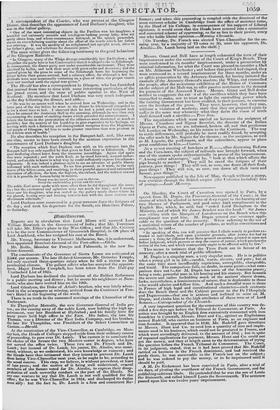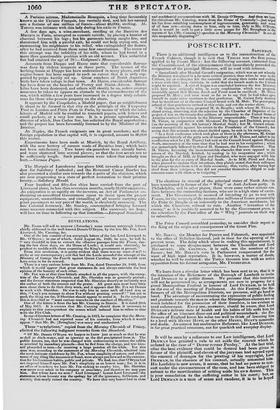On Monday, the Court of Cessation was opened in Paris,
by a speech from M. Dupin, the Procureur-General of the Court ; in the course of which he alluded in terms of deep regret to the burning of our two . Houses of Parliament, and paid some high compliments to the English Bar, which, he said, bad "ceded Lord Brougham to the Ministry, and of which Sir James Searlett was the head." Sir James was sitting with the Marquis of Lansdowne on the Bench when this compliment was paid hint. M. Dupin uttered one sentence appli- cable to the question of the amnesty. When referring to the use of a statistical return of the number of pardons, as well as convictions and acquittals, he said-
" In speaking of this, you will perceive that I allude merely to pardons ex- tended to individuals, aua upon yarticular grounds, after justice has had its course ; a thing far different from those general amnesties, granted in mass and before Judgment, which prevent or stop the course of justice, which paralyse the action of the law, and which consequently ought to be effected solely by law."
This seems to intimate that the Tiers Parti are in favour of an amnesty, after a mock trial of public offenders.
M. Dupin is a singular man, a very singular man. He is in politics what a young girl is in life—candid, warm, sincere, and pure; but at the same time most insufferably capricious, susceptible, changeable, and timid. The comparison fails, no doubt, in some point—what com- parison does not ?—for M. Dupin has none of the feminine graces; being a rude, powerful man in his bearing and his oratory. But beneath the severe and rather forbidding mask of the ancient classic drama, lurks, nevertheless, a feminineness of nature, that is deplorable to those who would admire and follow him. And such a dreadful want is there in France of high legal and constitutional character—such contrasts does the Bench there and the Cabinet present to the De l'Hospitals and Daguesseaus—that one is anxious and inclined to seize on M. Lupin, and clothe him in the high attributes of those men or of Lord Somers.—Correspondent if the pironiele.
A very important question for the commerce of this country was de- cided a tew days ago before the Tribunal de Commerce, at Paris. An action was brought by an English firm extensively connected with iron foundries in Cornwall, Messrs. Hunt and Co., against an Englishman named Radcliff, who carries on business at Paris, as an engineer and iron-founder. It appeared that in MO, Mr. Radcliff gave directions to Messrs. Hunt and Co. to send him a quantity of iron and imple- ments used in his business, which could not be procured in France, and which were accordingly delivered, to the amount of 184/. ; but in spite of repeated applications for payment, Messrs. Hunt and Co. could not get the money, and they at length came to the determination of trying the question before the French Tribunal de Commerce. The Court,
in its judgment, stated, that as it had been proved that Mr. Radcliff carried on business in the French dominions, and had received the goods there, he was answerable to the French law on the subject ; and he was ordered to pay the money, or to be imprisoned until it should be paid.
A M. De Richemont has been convicted in Paris, after a trial of six days, of plotting the overthrow of the French Govermnent, and for publishing seditious libels. He pretended that he was the son of Louis the Sixteenth, and called himself Louis the Seventeenth. The sentence passed upon him was twelve years' imprisonment.
A Parisian actress, Mademoiselle Bourgoin, a long time favourably known at the Thaatre Fnincais, has recently died, and left her natural son a fortune of one million of francs—about 40,000t. sterling. Al. .Toreno was intimate with this lady during his exile in France.
A few days ago, a wine.merchant, residing at the Barriere des Martyrs in Paris, attempted to commit suicide, by placing a brazier of charcoal between his legs ; but his garments having caught fire, and threatened him with *painful exit, he could not help crying out, and summoning his neighbours to his relief, who extiugutshed the flames, after he had received from them some few excoriations. The cause of this attempt was the infidelity of his wife, whom he had found in a more than questionable position with an old servant. This unfaithful fair had attained the age of 78!—Galignani's Messenger.
Accounts from Dieppe and Havre state that considerable damage was done by violent tempests at these ports. The terrace of the bathing-house at Dieppe has been undermined in many places, and the engine-house has been sapped to such an extent that it is only sup- ported by props hastily set up. Great numbers of North Anierivan birds have taken refuge in that town. At Havre, considerable damage has been done on the beaches of Perrey and Staint-Adress. Brick- kilns have been destroyed, and others will shortly be so, unless prompt measures be taken to oppose an obstacle to the encroachments of the sea, which within a few years have increased in a degree truly calami- tous for those who possess property on the shore.
It appears by the Compilador, a Madrid paper, that an establishment is about to be formed in that city on the principle of the Twopenny Tog in London and Petite Poste in Paris, by means of which the inha- bitants of Madrid will be enabled to transmit papers, with letters and small packets, at a very low rate. It is a private speculation, the director of which, Don Carlos Sor, has solicited the Royal approbation ; and the project has been favourably listened to by the Minister of the Interior.
At Naples, the French emigrants are in great numbers; and the foreign population in that capital will, it is expected, amount to 30,000 this winter.
Experiments have been made at Munich, by the Royal Artillery, with the new battery of cannon made of Bavarian iron ; which have not been satisfactory. Two heavy six-pounders have already burst, and were shattered into several pieces; so that the iron seems not to be sufficiently tough. Such precautions were taken that nobody was hurt.— German Paper.
The Marquis of Lansdowne has given 100/. towards a painted win- dow for Salisbury Cathedral ; and the Reverend Canon Bowles has also presented a similar sum towards the repairs of the cloisters, which are now progressing to a state of perfect restoration to their pristine beauty.—Salisbury Herald.
Four hundred and fifty-five ships have carried, from the port of Liverpool alone, in less than seventeen months, nearly 31,000 emigrants As emigration is so rapidly on the increase, an Act of Parliament au- thorizing an accredited Government agent to insist upon the proper equipment, seaworthiness, and victualling of all vessels carrying emi- grant passengers to any part of the world, is absolutely necessary. The late Colonial Secretary, Mr. Stanley, contemplated bringing forward some measure connected with this subject. His successor, we hope, will lose no time in following up that intention.—Liverpool Standard.



















 Previous page
Previous page